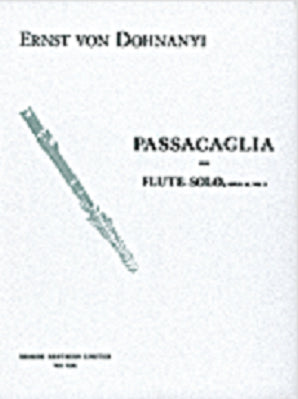Syrinx Music
Dohnanyi - Passacaglia OP 48 No 2 (Broude)
Dohnanyi - Passacaglia OP 48 No 2 (Broude)
Couldn't load pickup availability
Description
According to the autograph, Ernô Dohnányi finished his last composition, the Passacaglia for Solo Flute on 13 June 1959. At this time, the 82-year-old composer had already been living for 10 years in Tallahassee, where he was teaching piano and composition at the Florida State University (FSU). The assumption of Dohnányi's certain critics, whereas the composer had found the source of youth in Florida,1 was not causeless, since despite his regular concert-tours and growing tasks at the University, his last 10 years were very productive in composition. Beyond the Passacaglia and its "pair," the Aria for Flute and Piano (op. 48. no. 1), he composed three orchestral works (Concerto for Violin no. 2, op. 43; Concertino for Harp, op. 45; American Rhapsody, op. 47), one oratorio (Stabat Mater, op. 46) and piano pieces (Three Singular Pieces, op. 44), and besides, he revised his large-scale Symphony no. 2 several times.2 Unfinished works are also known from this time: sketches of a Requiem and a Flute Quartet survived, and we are also informed of a planned chamber piece, overture3 and viola concerto from letters.4 Dohnányi's American period has long been neglected by researchers and musicians, even in comparison with the earlier parts of his oeuvre: neither has it been examined in its entirety, nor in connection with his other works. Moreover, the definition "American period" is only based on biographical facts, and we still cannot answer such questions whether these compositions significantly differ from others; whether they form a group because of their musical characteristics; or in what aspects they are "American."5 It is questionable though, whether the disregard of them results from the preconception that in comparison with the earlier years, mainly of Vienna and Berlin, the last period shows a decline in an aesthetic sense; or from the distance of the source-material that makes them difficult to study from Hungary. The situation is aggravated for both the Hungarian and American musicologists by the fact that the sources are to be found in Tallahassee,6 while many of them are written in Hungarian or connected closely with Hungary. Besides, only in the last few years did a large amount of very significant sources accessible for scholars become.7 This paper attempts to give a possible approach of this period by analyzing a late piece, the Passacaglia for Flute, with a use of different kinds of sources and a goal of placing it into the whole oeuvre.
Although the setting is quite unusual - and, above all, it is quite unusual to write a characteristically polyphonic genre for a strictly monophonic instrument -, the passacaglia has many precedents in Dohnányi's oeuvre. Since after his early attempts he did not compose any sonatas for his own instrument, his most monumental work for piano is also a Passacaglia (op. 6), but he also wrote smaller pieces of this kind in several piano series (like the An Ada in the Winterreigen, op. 13, or the Cloches in the Six Piano Pieces, op. 41). The emotional and structural climax of his character variations, the Variations on a Nursery Song (op. 25) is a passacaglia, too (variation form in a variation form), similarly to the Credo of the Missa of Szeged (op. 35) also written in this form.
The choice of instrument was influenced by biographical circumstances: both the Aria and the Passacaglia were composed and dedicated for Ellie Baker who was the daughter of John Baker, president of Ohio University. The close friendship between the Dohnányis and the Bakers dated back to Dohnányi's first visit in Athens in 1948. Already before his settling in the U.S., he had been invited to Ohio as a guest professor of piano, lecturer and concert artist. This very first visit was received with an exceptionally great interest and warmth by the Athens musicians and music-lovers, which is clearly expressed in Baker's letter to Dohnányi's manager, Andrew Schulhof.
Share


